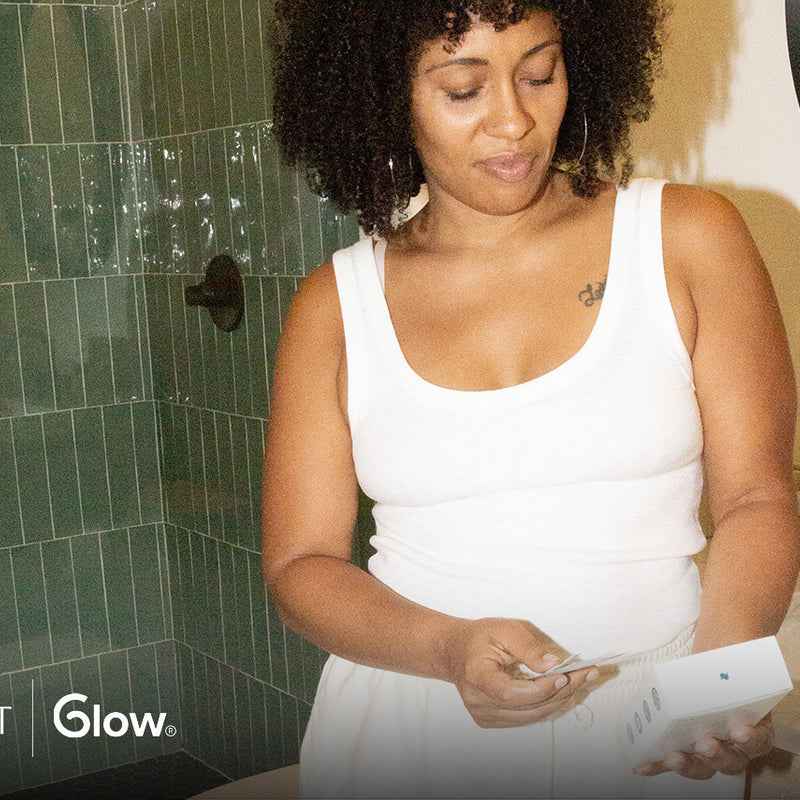Getting Pregnant After Stopping Birth Control: What You Need To Know

Just stopped, or thinking about stopping birth control, and curious how long it will take to get pregnant? Read our guide. All popular forms of birth control covered.
How long does birth control stay in your system after you stop taking it? The short answer is that for the most part, it doesn’t. And while many women believe that the effects of their contraceptive of choice linger after they stop using it, that's a myth.
Furthermore, there have been several studies looking at the return of fertility after stopping birth control. A comprehensive review of these studies found that birth control use does not negatively impact fertility. Let me say it again for the people in the back...birth control use does not negatively impact fertility! The study also showed the percentage of women who conceived within one year after stopping birth control.
Let’s take a look at each category of birth control in a little more detail.
Fertility by type of birth control
Natural and barrier methods (condoms, diaphragms, spermicide)
For those who rely on natural family planning methods, it might actually be easier to get pregnant since you already know when your fertile days are because you were avoiding them. Now you can do the opposite and start trying to conceive on those days. In the previously mentioned study review, 92% of women were pregnant by one year.
If you were using condoms (both male and female), diaphragms, or spermicide, there is no effect on fertility. These methods work by simply creating a physical barrier to block sperm from reaching the egg. Therefore, they do not affect ovulation. In this group, 94% of women were pregnant by one year.
Another plus to using condoms is the protection against sexually transmitted infections (STIs), especially since STIs are a common cause of pelvic inflammatory disease (PID) and can cause subsequent infertility.
Combination birth control methods (birth control pills, NuvaRing, the Patch)
This is the most common type of birth control used, primarily because it is cheap, convenient, and can treat a variety of other issues in addition to serving as contraception. Unfortunately, there is a lot of misconception about how these methods work and how quickly they can get out of your system.
The simple truth is that for most women, ovulation after these methods—regardless of how long you’ve been on them—will typically occur within a few weeks, though it can sometimes take one to three months. In fact, immediately after the pill is stopped, there can be an ovulatory rebound effect that results in a “super” fertile period.
Think about it—if you miss the pill for just a few days or your patch falls off, the biggest worry is that you may get pregnant. If these methods lingered in the body for a long time, this wouldn’t be a concern at all, and providers wouldn’t spend so much time instructing their patients to be consistent in using them.
Importantly, your period can take a little longer to come back than ovulation does (usually 1-3 months). However, just because you haven’t seen your period yet, doesn’t mean that you can’t get pregnant. By one year, studies show a 72-94% pregnancy rate in this group.
Nexplanon (aka "The Implant")
You can get pregnant right after this device is removed. Most women start to ovulate again by the end of the first month after removal. About 70-95% of women will be pregnant at the end of one year.
Intrauterine devices (IUDs)
Like the implant, it’s possible to get pregnant soon after your provider removes your IUD. Again, women typically ovulate within one month after removal. For most of these women, pregnancy occurs within six months to a year and 71-96% of these women will have gotten pregnant at the one year mark.
Depo-Provera (aka “The Shot”)
Now so far, none of the above birth control methods have any significant effects on fertility. Depo-provera is the one outlier. Women who used Depo-Provera may have to wait a period of time for normal fertility to resume after they've had their last injection. It can sometimes take up to 10 months or more to ovulate again and it can take up to 18 months for normal periods to restart. This is why the depo shot is not the recommended birth control for those who are hoping to have children within a year.
Learn more about getting pregnant after depo here.
Don't forget the fertility lube!
An issue that comes up frequently with couples that are TTC is vaginal dryness. In fact, a survey of 900 TTC couples showed that vaginal dryness was two times higher in these couples than in the general population. The survey also revealed that sexual intimacy was negatively impacted because of this.
Sperm-friendly lubricants (also known as fertility friendly or TTC lube) are great for couples trying to conceive. Not only do lubricants help reduce friction and make sex more pleasurable, but the right lubricant can make sure that nothing is in the way of sperm meeting egg.
The myth of the birth control cleanse
Now that we’ve explained all the methods, let’s move on to some additional important facts to know.
While depo does seem to have a lingering effect, there is no need to “cleanse” depo or any of the other birth control methods out of your system before trying to conceive. Several birth control cleanses exist on the market, but there is absolutely no evidence that they are at all necessary or helpful in speeding up the ovulation process. The human body is amazing, and we have two organs dedicated to cleansing if needed—that would be your liver and kidneys— so you can keep your money in your pocket. At best, these cleanses are harmless and act as simple multivitamins; at worst, they can be harmful depending on how safe the ingredients are or how stringently the product was processed.
There is no need to “cleanse” any birth control methods out of your system before trying to conceive.
Thinking back to the increased chances of conceiving right after stopping a combination birth control option (the “super” fertile window), one would think that the best thing would be to try to conceive as soon as possible after stopping your birth control. It is actually recommended to wait until you’ve had one or two cycles before trying to conceive, but not because of safety concerns. This is to allow you to more reliably determine the length of your cycle, identify your fertile window, and be able to better date the pregnancy when you actually do get pregnant.
What if you don’t have a period right away?
While this is not common, it is considered normal. Some women don’t get their period for a few months after they stop combined hormonal birth control. As mentioned earlier, these forms of birth control affect your hormonal balance in order to stop ovulation and as a result, some women simply need a little more time to adjust.
But remember, you can still get pregnant before you have that first period. In fact, if your body ovulated immediately after you stopped birth control and you then had unprotected sex, you may be pregnant already—which would stop you from having a period. So if you haven’t had a period since stopping your birth control and there’s a possibility of pregnancy, take a pregnancy test.
If you haven’t had a period within three months of coming off your birth control (and you weren’t on the depo shot), at that point it may be wise to be seen and evaluated just to make sure there’s no other reason you haven’t resumed your cycles.
An important reminder to all women: just because your fertility has returned, doesn’t mean that you will get pregnant immediately. You may have noticed that when pregnancy rates at one year were broken down in each birth control category, none of them had a rate of 100%.
There are many factors that can affect overall fertility so while for some women pregnancy may happen within a month of stopping birth control, for others it may take a while longer. At that point, your fertility and ability to conceive are dependent on several other factors—such as age and overall health—that have nothing to do with your previous birth control use.
A couple is not deemed infertile in the US unless they’ve had one year of unprotected sex without getting pregnant. If you’re over 35, the recommendation is to be seen after six months of trying. If you and your partner fall under either of those categories it may be time to talk to your provider about fertility help. For more guidance on getting pregnant, check out our OBGYN's Guide to Getting Pregnant.
Sign Up For 10% Off Your First Order!
Sign up for insider access, exclusive deals, and OBGYN insights!
Reach Out, We're Here
Have questions about your order or products? For the speediest answer, check out our FAQ section. Need something else? Come find us below.
Customer Support
support@natalist.com
Press Inquiries
media@everlyhealth.com
Business & Partnerships
team@natalist.com
Affiliates + Influencers
team@natalist.com
Job Openings
Careers Page






















